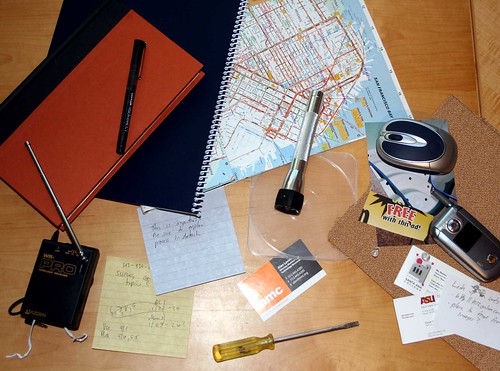This article written by Peter Walsh, clutter crusher extraordinaire from Clean Sweep fame has a new book out Lighten Up: Love What You Have, Have What You Need, Be Happier with Less and excerpted on Lifehacker: How Much is Your Clutter Costing You?
He has some simple ways of adding up the costs by going through your house, room by room, and adding up the cost of all of the items you no longer use. It has a physical cost and (at times) an emotional cost as well.
He even uses a formula for calculating the cost of your clutter per square foot:
Value of your home ÷ Square footage of your home = Value of each square foot
_______________ ÷_______________ = _______________
So, if you live in a $250,000 home and it's 2,500 square feet, then each square foot is worth $100.
The value of each square foot of my home is: _______________
Now let's calculate how much of your home's space is occupied by things you don't use. Walk around your home and make a rough calculation of how many square feet are unusable because of the clutter. Don't forget the basement, closets, and garage!
The number of square feet in my home that are occupied by things I don't use: _______________
Now let's find out how much that wasted square footage is worth:
Value of square footage × Square feet occupied by things you don't use = Value of unusable space
_______________ x_______________ = _______________
This is interesting, but not as helpful for me. Another way to calculate these costs is in TIME. Such as when you spend 15 minutes looking for your car keys in the morning, or the hour spent looking for the medical form that you needed to complete so your son could sign up for soccer. Or the 2 hours you spend trying to find the Robo-Grip Pliers to fix the dripping kitchen sink, and then, not finding it, heading out to Lowes to purchase another tool to replace it. Time is money. And these days my time is more valuable than my money... most of the time.
But money is also something that gets wasted in the midst of clutter. You all know of my poor track record with flash drives. I have purchased 3 of them in the last 4 months, and have already "lost" one of them. I know that it will turn up eventually in a coat pocket, or under a stack of papers, but it is missing when I need it, so I buy another one for $12. The cost of replacing the Robo-Grip Pliers, $17.94 for a set of similar tools at Lowes. I've bought 3 vitamin capsule-sized microphones for my iPod Touch because I simply knew I wouldn't be able to keep track of them (at about $1.50 each) and already 2 of them are missing. 2 sets of iPod headphones (another $12). I bought a second copy of one of my favorite books on time management:
Getting Things Done by David Allen, because I either lent it to someone and forgot who, or lost it altogether ($15). And close to $50 in lost or damaged library books this year alone.
So as you can see... clutter indeed has a cost. Think of all of the items and hours lost, and spring cleaning is a great time to clear out that clutter.
 From forming a new habit (Episode #163) to creating text macros (Episode #167), Robbins covers techincal issues and decisions (such as buying a computer - #154), dealing with specific organizational problems (such as organizing gift and credit cards - #165 or planning a successful group trip - #161), or general work habits (such as how to use the phone better - #151 or making good decisions - #111).
From forming a new habit (Episode #163) to creating text macros (Episode #167), Robbins covers techincal issues and decisions (such as buying a computer - #154), dealing with specific organizational problems (such as organizing gift and credit cards - #165 or planning a successful group trip - #161), or general work habits (such as how to use the phone better - #151 or making good decisions - #111).
